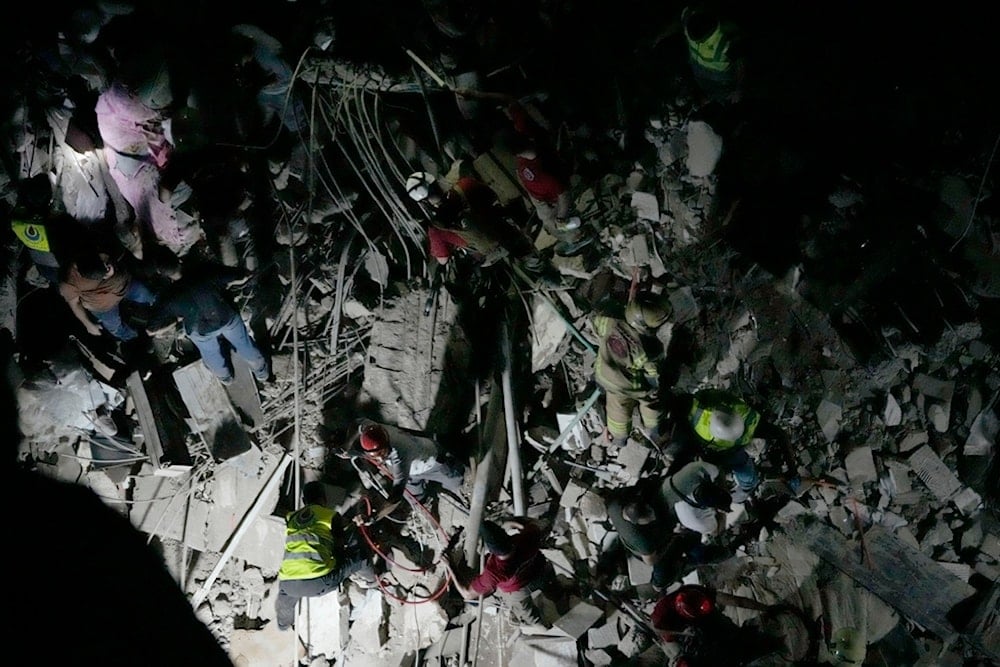Lebanese court to release dangerous convicted 'Israel' spy: Report
Al-Mahatta reports a possible release of Mohieddine Hasnah, convicted of spying for the Israeli regime in Lebanon, raising concerns of renewed leniency toward collaborators.
-

Civil defense workers check for victims between the wreckage of a destroyed building that was hit by an Israeli airstrike in the southern suburbs of Beirut, Lebanon, Tuesday, July 30, 2024. (AP)
Lebanon’s Military Court of Cassation, headed by Judge Mounir Suleiman, has decided to release Mohieddine Hasnah, one of the country’s most dangerous collaborators with the Israeli regime, who had been sentenced to 15 years in prison.
Hasnah’s release comes after serving only 22 months in detention, sparking widespread controversy given his conviction and the gravity of the charges against him.
According to the Al-Mahatta investigative platform's report, Hasnah was found guilty of providing the Israeli enemy with highly sensitive information on telecommunications networks in Beirut and its southern suburbs.
كما توقّعنا في "المحطة" قبل أيام، محكمة التمييز العسكرية برئاسة القاضي منير سليمان إطلاق سراح عميل مدان ومحكوم بالسجن ١٥ سنة، والاكتفاء بمدة توقيفه البالغة ٢٢ شهرا.
— Al-Mahatta | المحطة (@Almahatta0) August 28, 2025
نبذة عن العميل محيي الدين حسنة:https://t.co/uHRtQ7hkcb https://t.co/OZiQPYoBLY
The data included details on cellular infrastructure and surveillance of Wi-Fi networks using advanced equipment capable of scanning and locating phones, as well as infiltrating internet networks in homes and institutions. These techniques were reportedly used by the Israeli occupation in its military operations.
The investigation further revealed that the equipment Hasnah operated also helped in identifying broadcast frequencies for pager devices, which were used by the Israeli occupation to wage a large-scale terror attack against Hezbollah fighters and civilians alike in 2024.
Revival of a dangerous pattern
Al-Mahatta reported that Hasnah’s defense lawyer appealed the ruling to the Military Court of Cassation. Should the court decide to grant his release, the move would revive what the outlet describes as a pattern of “acquitting collaborators,” long associated with the military judiciary.
Such a step, the outlet added, would cement the perception of the newly appointed head of the court as setting a dangerous precedent that could allow even those who supplied the enemy with the most sensitive security data to walk free before a final verdict is reached.
According to the outlet, this development, if confirmed, can only be interpreted as a clear signal that the military judiciary "is reopening the door to settlements with collaborators at the expense of the blood of martyrs, the security of the Lebanese people, and the future of the country."
No strategic goal
It is noteworthy that days after the pager attack in Lebanon, analysts who spoke to The New York Times said the attack had "no clear strategic goal". At least 12 people were killed and nearly 3,000 others were wounded as pagers simultaneously went off and detonated across the country.
Analysts stressed that the aggression "had no clear strategic impact," as it did not change the military balance along the Lebanese-Palestinian border, where operations continue as they have been since the beginning of the war on Gaza.
The NYT added that the aggression was only a display of "Israel's" technical prowess and did not diminish the frustration among Israelis, as Hezbollah remained on the northern border, preventing tens of thousands of settlers from returning.

 3 Min Read
3 Min Read










